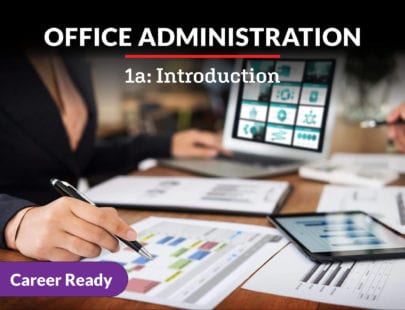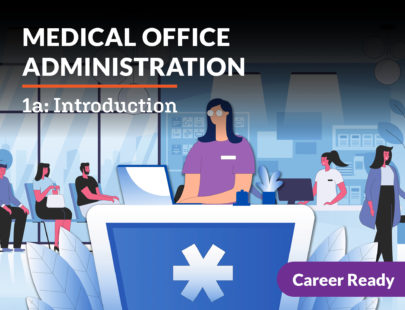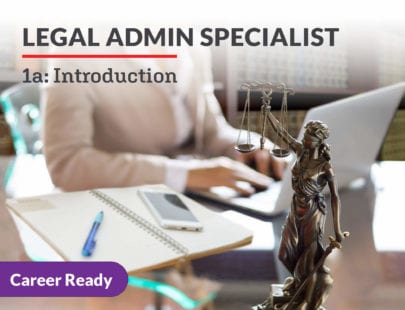
Touch Systems Data Entry: Keyboard Like a Pro
Watching a keyboard wizard work their magic over the keys is mesmerizing, and now, you can learn the magic of their movements! In this course, you’ll build a solid foundation of typing skills, develop good habits and techniques, and build confidence as you become a typing wiz. You’ll also learn proper finger placement, correct posture to improve speed and accuracy, and explore future careers where typists thrive. Get ready to become a typing magician today!
Units at a Glance
Unit 1: Why Type?
There is no crystal ball to predict the future. Yet, the advances in technology continue to indicate the importance of being computer and technology savvy. To efficiently and accurately interact with technology, it’s critical to develop typing skills. This unit will show you why strong typing skills are necessary for your day-to-day living, and how this skill can increase your productivity and save you time. And who doesn’t want to save time? We’ll also explore the different jobs that require the daily use of typing so you can consider these options as you map out your future career. Let’s dive in!
What will you learn in this unit?
- Describe how communication has changed in recent years
- Discuss personal reasons to type
- Explain the basic requirements of different typing jobs
- Identify a variety of nontyping jobs
- Use student leadership opportunities to help plan your career
Unit 2: Keyboards Through the Years
The keyboard is an extraordinary invention that has been used for typing for hundreds of years. This unit will take you on a journey of discovery as you learn how keyboards have changed and evolved over time. Your journey will begin by learning about early typewriters, the keyboard layout, the progress toward the electric typewriter, and keyboards used today. Finally, you will discover the importance of caring for typewriters and keyboards. Here we go!
What will you learn in this unit?
- Explain the history of early typewriters
- Distinguish between the different keyboard layouts used for typing
- Discuss the evolution of electric typewriters
- Identify modern-day keyboards used today for typing
- Demonstrate caring for keyboard equipment
Unit 3: Typing Techniques
Wouldn’t you love to be able to fly over the keys of your keyboard, typing like a pro? Developing good typing habits and technique is the key to doing just that! Building a good foundation of typing skills will assist you in becoming a quick and accurate typist so you can work with ease and confidence. This unit will introduce you to the proper sitting posture and finger placement to help you maximize your performance as a typist, save time, and prevent injury. You will also learn the alphabetic, numeric, and symbol keys commonly found on a computer keyboard. Get ready to build those skills!
What will you learn in this unit?
- Demonstrate the proper typing posture
- Locate home row on the keyboard
- Explain the uses of the different numeric keys on the keyboard
- Discuss the functions of the symbol keys
Unit 4: The Document Production Process
Being able to communicate effectively in writing is a crucial life skill. A big part of making your writing clear and effective is planning! This unit will guide you through the document production process, which involves outlining, drafting, editing, and proofreading text within a document. Learning to plan what you want to say and how you say it can make all the difference in helping your writing achieve its goal and avoiding misunderstandings. Are you ready for this writing adventure? Let’s get typing!
What will you learn in this unit?
- Use a variety of written resources in your writing process
- Identify a clear purpose, type of document, and audience for your writing
- Create an outline and a rough draft
- Edit and proofread your work
Unit 5: Personal Communications
Learning to communicate with others in a meaningful way will benefit you for the rest of your life. And writing is an important part of communication! Your writing makes a lasting impression and you want that impression to be positive. This unit will introduce you to some of the different types of personal communication you can use on a daily basis to create new relationships and strengthen existing ones. Let’s explore how you can be better equipped to prepare personal letters, compose an email, and produce written messages for online publication so you can stay in touch with others.
What will you learn in this unit?
- Prepare and format personal letters
- Compose an email
- Produce written messages for online publication
- Discuss the evolution of written communication through time
Unit 6: Business Communications
There are many forms of written communication used in today’s workplace. What you communicate and how you communicate it is extremely important. Words can determine success or failure. Through words, businesses and organizations can earn or lose trust, gain or miss out on revenue, and add or drop clients/customers. In this unit, we’ll cover some of the basic forms of business communication, such as business letters, memos, press releases, and business reports, and how to make them the best that they can be!
What will you learn in this unit?
- Compose and format business letters
- Create memos for business correspondence
- Write press releases to share information with the media
- Produce and format a business report
Unit 7: Speed, Accuracy, and Improvement
Typing is a skill that will benefit you now and in the future. To become a consistently accurate and quick typist, it takes practice. The time and effort you put forth to practice your typing skills will automate your thinking and move your fingers quickly into the correct position. Imagine the time you can save by producing accurate and quality work! Are you ready to explore some techniques and resources you can begin using today to increase your typing speed and accuracy? Let’s get started!
What will you learn in this unit?
- Identify the importance of accuracy when typing
- Discuss the value of increasing typing speed
- Apply different techniques to improve typing skills
- Use online resources to practice typing
Unit 8: Using Your Skills in the Workplace
As you look for a job, employers will expect you to have a variety of skills, some technical (like typing) and some more nuanced (like communication skills). The work you are doing now to develop and improve the many skills you will need will serve you for a lifetime. The key to a satisfying career is finding something that you enjoy doing and developing the skills necessary to excel at it. Besides the skills we’ve already covered in this course, in this unit you will gain insights into understanding legal issues within the workplace, how to demonstrate professionalism in the workplace, and how to collaborate with others—all very helpful when it comes time to launch your career!
What will you learn in this unit?
- Describe legal issues that employees face in the workplace
- Demonstrate professionalism at work
- Communicate effectively with others on work assignments
- Plan for a typing career
Required Materials
Physical
- Computer (to use as prop)
- Video recording device
- Paper
- Notebook
- Pen or pencil
- Digital camera
- Magazine
- Envelope
- Postage stamp
Software
- Word processing software
- Presentation software
- typing.com
- typingclub.com
- keybr.com



